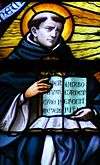Jean Daniélou
| His Eminence Jean-Guenolé-Marie Daniélou S.J. | |
|---|---|
| Cardinal-Deacon of San Saba | |
 Giorgio La Pira and Daniélou in Florence, 1953 | |
| Church | Roman Catholic Church |
| In office | 30 April 1969 - 20 May 1974 |
| Predecessor | Augustin Bea |
| Successor | Joseph Schröffer |
| Orders | |
| Ordination | 20 August 1938 |
| Consecration |
19 April 1969 by François Marty |
| Created Cardinal |
28 April 1969 by Pope Paul VI |
| Personal details | |
| Birth name | Jean-Guenolé-Marie Daniélou |
| Born |
14 May 1905 Neuilly-sur-Seine, France |
| Died |
20 May 1974 (aged 69) Paris, France |
| Previous post | Titular Archbishop of Taormina (1969) |
| Motto | Fluvium aquæ vitæ ("River of life") |
Part of a series on the |
| Society of Jesus |
|---|
 Christogram of the Jesuits. |
| History |
| Hierarchy |
| Spirituality |
| Notable Jesuits |
|
|
Jean-Guenolé-Marie Daniélou, S.J. (French: [danjelu]; 14 May 1905 – 20 May 1974) was a French member of the Jesuit order and a Roman Catholic cardinal. He was also a theologian and historian and a member of the Académie française.
Biography
Early life and studies
Jean-Guenolé-Marie Daniélou was born on 14 May 1905 in Neuilly-sur-Seine. He was the son of Charles Daniélou and Madeleine Clamorgan. His father was an anticlerical politician who served in the French government several times as a minister while his mother was an educator and the founder of institutions for women's education. His brother Alain (1907–1994) was a noted Indologist and a renowned historian.
Daniélou studied at La Sorbonne and passed his agrégation in grammar in 1927. He joined the Society of Jesus in 1929 and became a teacher where he initially taught at a boys' school in Poitiers. He taught there from 1934 to 1936. He subsequently studied theology at Fourvière in Lyon under Henri de Lubac, who introduced him to patristics, the study of the Fathers of the Church. He was ordained as a priest on 20 August 1938.[1]
Priesthood, episcopate and cardinalate
During World War II, Daniélou served with the Armée de l'Air (Air Force) in 1939–1940. After the fall of France to Nazi Germany, he was demobilised and returned to civilian life. He completed his doctoral thesis on the spiritual doctrine of St. Gregory of Nyssa and received a doctorate of theology in 1942. At that time, he was appointed chaplain to the ENSJF, the female section of the École Normale Supérieure, at Sèvres. He then began full-time research in the field of patristics, and became one of the founders of the Sources Chrétiennes collection.
In 1944 Daniélou was named Professor of Early Christian History at the Institut Catholique de Paris, and later became dean. Beginning in the 1950s, he produced several historical studies which included The Bible and the Liturgy, The Lord of History, and From Shadows to Reality, that provided a major impetus to the development of Covenantal Theology.
At the request of Pope John XXIII, he served as a peritus (expert consultant) to the Second Vatican Council. He was appointed a bishop by Pope Paul VI in 1969 for which the titular see of Taormina was created. He received episcopal consecration on 19 April 1969 in Paris. A week later, on 28 April, he was named a cardinal by Pope Paul VI who made him the Cardinal-Deacon of San Saba.[2]
Paul VI had offered him the elevation twice before but he refused. He accepted the third time because the pope told him: "I need you to be a cardinal so that you might suffer with me for the Church".
He was elected to the Académie française on 9 November 1972, to succeed Cardinal Eugène-Gabriel-Gervais-Laurent Tisserant.
Death and legacy
His unexpected death occurred in 1974 in the home of a woman who was alleged to be a prostitute. The Society of Jesus, after an investigation, determined that Daniélou was bringing money to pay for the bail of the woman's husband.
His brother has never doubted Daniélou's charity:
"His death and the scandal provoked by it, when he had become one of the leading figures of the Church, was a sort of posthumous vendetta, one of those favors that the gods bestow on those whom they love. If he had died just a little while sooner or later, or if he had been visiting a lady of the sixteenth arrondissement under the pretext of works of charity, instead of bringing the revenue of his theological writings to a poor and needy woman, there would have been no scandal.
"Jean had always dedicated himself to disregarded people. For a certain period he had celebrated a Mass for the sake of homosexuals. He tried to help prisoners, criminals, troubled young people, prostitutes. I deeply admired this ending of life similar to that of the martyrs, whose fragrance rises to heaven amid the opprobrium and sarcasm of the crowd. He died as true saints die, in ignominy, in mockery, in the disdain of a spiteful and vile society."[3]
Bibliography
A number of his works on the early Church abridged for a popular audience remain in print.
French works, with English translations
- Platonisme et théologie mystique: doctrine spirituelle de saint Grégoire de Nysse, (Paris: Aubier, 1944)
- 'Les orientations preésentes de la pensée religieuse', Études 249, (1946), 5-21
- Origène, Table ronde, Paris, 1948 [ET: Origen, trans Walter Mitchell, (New York: Sheed & Ward, 1955)]
- Sacramentum futuri; études sur les origines de la typologie biblique, (Paris: Beauchesne, 1950)
- Bible et liturgie, la théologie biblique des sacrements et des fêtes d'après les Pères de l'Église, Cerf, Paris, 1951 [ET: The Bible and the Liturgy, Liturgical Studies, 3 (Notre Dame, IN: University of Notre Dame Press, 1956)]
- Les anges et leur mission, d'après les Pères de l'Église, Desclée, Paris, 1952 [ET: The Angels and their Mission: According to the Fathers of the Church, trans David Heimann, (1957)]
- Essai sur le mystère de l'histoire, (Paris: Éditions du Seuil, 1953)
- Dieu et nous, Bernard Grasset, Paris, 1956. [ET: God and the Ways of Knowing, trans Walter Roberts, (1956; repr San Francisco, CA: Ignatius Press, 2033)]
- Les manuscrits de la Mer Morte et les origines du Christianisme, L'Orante, Paris, 1957 [ET: The Dead Sea Scrolls and Primitive Christianity, (Greenwood Publishing Group, 1979)]
- Histoire des doctrines chrétiennes avant Nicée, 3 vols, (Paris: Desclée, Éditions du Cerf, 1958-1978)
- Théologie du Judéo-Christianisme, Histoire des doctrines chrétiennes avant Nicée vol 1, (Tournai : Desclée, 1958) [ET: The theology of Jewish Christianity, trans and ed by John A Baker, (London: Darton, Longman and Todd, 1964)
- Message évangélique et culture hellénistique aux IIe et IIIe siècles, Histoire des doctrines chrétiennes avant Nicée vol 2, (Tournai: Desclée, 1961) [ET: Gospel Message and Hellenistic Culture, ed and trans John Austin Baker, (London: Darton, Longman and Todd, 1973)]
- Les origines du christianisme latin, Histoire des doctrines chrétiennes avant Nicée vol 3, (Paris: Cerf, 1978) [ET: The Origins of Latin Christianity, (Philadelphia: Westminister Press, 1977)]
- Philon d'Alexandrie, Fayard, Paris, 1958
- Approches du Christ, (Paris: B. Grasset, 1960) [ET: Christ and Us, trans Walter Robert, (New York: Sheed & Ward, 1961)]
- Les Symboles chrétiens primitifs, Seuil, Paris, 1961
- L'Église des premiers temps : Des origines à la fin du IIIe siècle, Seuil, Paris, 1963
- (with Henri Marrou), Des origines a saint Grégoire le Grand, (Paris: Éditions du Seuil, 1963)
- Les Évangiles de l'enfance, (Paris: Seuil, 1967) [ET: The infancy narratives, trans Rosemary Sheed, (London: Burns & Oates, 1968)]
- La Trinité et le mystère de l'existence, (Desclée de Brouwer, Paris, 1968)
- 'Saint Hilaire et son temps', in Hilaire de Poitiers: évêque et docteur; cinq conférences données à Poitiersà l'occasion du XVIe centenaire de sa mort (368-1968), (Paris: Études Augustiniennes, 1968)
- La Foi de toujours et l'homme d'aujourd'hui, (Paris: Beauchesne, 1969)
- La Résurrection, (Paris: Éditions du Seuil, 1969)
- L'être et le temps chez Grégoire de Nysse, (Leiden: Brill, 1970)
Other works
- Libretto for Stravinsky's Oedipus Rex: a Latin translation of Jean Cocteau's arrangement of Sophocles' original Oedipus the King.
Other English translations
- The Salvation of the Nations, trans Angeline Bouchard, (New York: Sheed and Ward, 1950)
- Advent, trans Rosemary Sheed, (1950)
- Holy Pagans of the Old Testament, trans Felix Faber, (London: Longmans, Green and Co, 1957)
- The Lord of History: Reflections on the Inner Meaning of History, trans Nigel Abercrombie, (1958; repr Cleveland, OH: Meridian, 1968)
- The Presence of God, trans Walter Roberts, (Baltimore, MD: Helicon, 1959)
- From Shadows to Reality: Studies in the Biblical Typology of the Fathers, trans Wulstan Hibberd, (London: Burns & Oates, 1960)
- The ministry of women in the early church, (Leighton Buzzard: Faith Press, 1961)
- The Advent of Salvation: A Comparative Study of Non-Christian Religions and Christianity, trans Rosemary Sheed, (New York: Paulist, 1962)
- The scandal of truth, trans WJ Kerrigan, (London: Burns & Oates, 1963)
- Primitive Christian symbols, trans Donald Attwater, (London: Burns & Oates, 1964)
- Prayer as a political problem, ed and trans JR Kirwan, (New York: Sheed and Ward, 1967)
- Dialogue with Israel, (Baltimore: Helicon, 1968)
- Myth and Mystery. (New York: Hawthorn Books, 1968)
- God's Life in Us, (Dimension Books, 1969)
- Historical Theology. Viking Press, 1970
- Why the Church? Franciscan Press, 1975
- Prayer: The Mission of the Church. (Grand Rapids, MI: WB Eerdmans, 1996)
References
- ↑ "Jean Guénolé Louis Marie Cardinal Daniélou, S.J.". Catholic-Hierarchy.org. David M. Cheney. Retrieved 23 January 2015.
- ↑ Salvador Miranda. "Daniélou, S.J., Jean". The Cardinals of the Holy Roman Church. Retrieved 23 January 2011.
- ↑ http://chiesa.espresso.repubblica.it/articolo/1350992?eng=y
External links
- Jean Daniélou bio on IgnatiusInsight.com
- Jean Daniélou profile and books on Goodreads
- File on Cardinal Daniélou on the Académie française website

